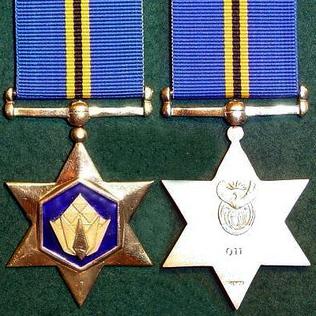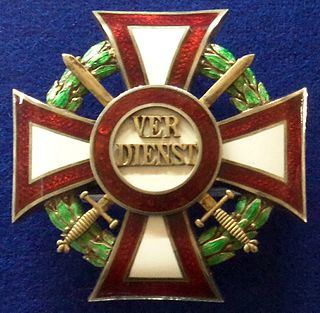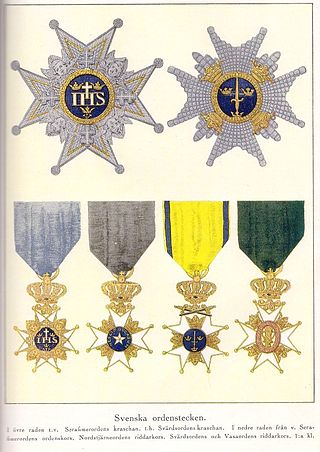
The flag of Bosnia and Herzegovina contains a medium blue field with a yellow right triangle separating said field, and there are seven full five-pointed white stars and two half stars top and bottom along the hypotenuse of the triangle.

The coat of arms of Bosnia and Herzegovina was adopted in 1998, replacing the previous design that had been in use since 1992 when Bosnia and Herzegovina gained independence. It follows the design of the national flag. The three-pointed shield is used to symbolize the three major ethnic groups of Bosnia, as well as allude to the shape of the country.

The Order of Orange-Nassau is a civil and military Dutch order of chivalry founded on 4 April 1892 by the queen regent, Emma of the Netherlands.

The Royal Order of the Sword is a Swedish order of chivalry and military decoration created by King Frederick I of Sweden on 23 February 1748, together with the Order of the Seraphim and the Order of the Polar Star. The motto of the order is in Latin: Pro Patria.

The iPhrothiya yeGolide - Golden Protea, post-nominal letters PG, was instituted by the President of the Republic of South Africa on 16 April 2003 and came into effect on 27 April 2003. It can be awarded to all ranks who have distinguished themselves by exceptional leadership or exceptional meritorious service and the utmost devotion to duty. It is South Africa's highest existing military decoration for meritorious conduct.

The Savez izviđača Bosne i Hercegovine is the state Scouting organisation of Bosnia and Herzegovina. It was founded on 17 December 2011 through the merger of the three constituent organisation of its predecessor, the Savjet izviđačkih organizacija u Bosni i Hercegovini, which was a member of the World Organization of the Scout Movement since 1999. The coeducational Council of Scout Associations in Bosnia and Herzegovina has 1,250 members as of 2011.
The Order of Leopold II is an order of Belgium and is named in honor of King Leopold II. The decoration was established on 24 August 1900 by Leopold II as Sovereign of the Congo Free State and was in 1908, upon Congo being handed over to Belgium, incorporated into the Belgian awards system. The order is awarded for meritorious service to the sovereign of Belgium, and as a token of his personal goodwill. It can be awarded to both Belgians and foreigners, and is seen as diplomatic gift of merit.

The Order of Karađorđe's Star is the third highest state order of Serbia. The order is awarded by the decree of the President of the Republic on special occasions, typically at the ceremonies held on the Statehood Day. It is awarded for special merits and successes in representing Serbia and its citizens. It can be awarded to individuals and institutions.

The Military Merit Cross was a decoration of the Empire of Austria and, after the establishment of the Dual Monarchy in 1867, the Empire of Austria-Hungary. It was first established on October 22, 1849 and underwent several revisions to its design and award criteria over the years of its existence. It became obsolete in 1918 with the dissolution of the Austro-Hungarian Empire.

The Military Merit Medal was a military decoration of the Empire of Austria-Hungary. It was founded by Emperor Franz Joseph I on March 12, 1890. The Military Merit Medal is often referred to as the "Signum Laudis" after the inscription on the reverse of the medal.

The orders, decorations and medals of Finland form a system through which the Finnish government shows its respect to persons who have distinguished themselves on some walk of life. The legal basis of the system is the Act on the displays of public recognition (1215/1999) which grants the president the authority to issue decrees on orders, medals and titles.

The Military Order of Savoy was a military honorary order of the Kingdom of Sardinia first, and of the Kingdom of Italy later. Following the abolition of the Italian monarchy, the order became the Military Order of Italy.

Order of Freedom is the highest decoration of Bosnia and Herzegovina. It is awarded for special merits in realization of freedom and human rights, for development of understanding and trust between citizens and people of Bosnia and Herzegovina, and for merits in construction of democratic relations. Order was established in 1994.

The Orders, decorations, and medals of Sweden have a historical basis, reaching back to the 1561 founding of the extinct Order of the Savior. The Royal Order of Knights of Sweden were only truly codified in the 18th century, with their formal foundation in 1748 by Frederick I of Sweden. Significant reforms in 1974 changed the conditions and criteria under which many orders and decorations could be awarded.
This is a list of orders, decorations, and medals of Austria-Hungary.

The House Order of Henry the Lion In German: Hausorden Heinrichs des Löwen, was the House Order of the Duchy of Brunswick. It was instituted by William VIII, Duke of Brunswick on 25 April 1834. The ribbon of the Order was red with yellow edges. It had five grades: Grand Cross, Grand Commander with Sash, Commander, Knight 1st Class, Knight 2nd Class, plus Medal of Merit for Science and Arts, the Cross of Merit and the Medal of Honour. The Order was named in honour of Henry the Lion, who remains a popular figure to this day.

The Merit Medal in Silver, post-nominal letters MMS, was instituted by the President of the Republic of South Africa in April 1996. It was awarded to veteran cadres of Umkhonto we Sizwe, the military wing of the African National Congress, who had distinguished themselves during the "struggle" by exceptionally meritorious service and particular devotion to duty.
Orders, decorations and medals of Republika Srpska is a system of awards in Republika Srpska. There are 15 orders and 7 medals.
Order of Military Merits was a state decoration awarded in Yugoslavia, divided into three classes. It was awarded to commanders of units and civilians serving in the Yugoslav People's Army, as well as individuals in trade unions or other organizations with outstanding contributions and accomplishment of tasks of special immediate importance for national defense.
 Order of Freedom
Order of Freedom  Order of the Gold Coat of Arms of Bosnia and Herzegovina with Swords
Order of the Gold Coat of Arms of Bosnia and Herzegovina with Swords Order of the Gold Coat of Arms of Bosnia and Herzegovina with Sash
Order of the Gold Coat of Arms of Bosnia and Herzegovina with Sash Order of the Silver Coat of Arms of Bosnia and Herzegovina with Swords
Order of the Silver Coat of Arms of Bosnia and Herzegovina with Swords














